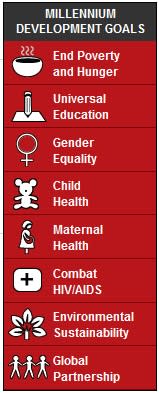Cameron in Liberia: What next for millenium development goals?
Key world leaders will be considering how far they have come in achieving the aims of the MDGs, and what the next steps are from here.
Prime Minister David Cameron is in Liberia, where he has called for the next wave of international development to focus on extreme poverty.
Mr Cameron will co-chair a meeting of the UN's high-level panel to decide what targets to bring in after the Millennium Development Goals (MDG) expire in 2015.
Key world leaders will be considering how far they have come in achieving the aims of the MDG, and what the next steps are from here.
The MDG centres around eight goals - ending poverty and hunger, universal education, gender equality, child health, maternal health, combating HIV/AIDS, environmental sustainability and global partnership.
Mr Cameron said ahead of his visit to Liberia that bolstering security and civil structures was also crucial, alongside aid measures.
Regional officials have given their verdict on whether the MDGs are working - experts in Latin American and the Caribbean, for example, say goals on inequality, global finance and the environment have been missed.

ECLAC (Economic Commission for Latin America and the Caribbean) Executive Secretary, Alicia Bárcena, said: "This region has made a lot of efforts but there remain structural gaps that impede the region's sustainable development. [...] 57 million people were taken out of poverty, buy how do we sustain these results when we have a highly indebted middle class?"
Last summer, the UN said it had met three targets of the MDGs relating to poverty, slums and water.
The 'MDG Report 2012' stated that parity in primary education between boys and girls has been achieved, and they have also halved the proportion of people without access to improved sources of drinking water.
UN Secretary‐General Ban Ki‐moon said that in order for the rest of the targets to be met by 2015, governments must make sure they 'do not waiver from their commitments made over a decade ago'.

Mr Cameron had insisted before his Liberia trip that 'it is very important we keep a focus on eradicating extreme poverty'.
Humanitarian charities say that, although a lot of work has been done to do this, there is still plenty of room for improvement - starting by targeting corporate tax-dodging.
Oxfam claim that in Liberia alone, over $1billion in 'illicit finances' flowed from the country every year in the last decade from companies and individuals.
The charity say this amount is twice the average sum it received in aid, and as a result 'these companies are effectively taking food from hungry mouths'.
Oxfam’s chief executive Barbara Stocking said: "Unpaid taxes by greedy corporations is enough to help poor countries end global hunger three times over.
"At this meeting, David Cameron should be pushing for an end to global hunger by 2025, and an end to tax dodging which could pay for this and much more."
So what are the priorities now for achieving the rest of the MDGs before 2015?
Job creation and economic transformation are likely to be at the top of the list.
The World Bank's 2013 World Development Report said 600m new jobs are needed over the next 15 years, especially in Africa and Asia.
After the consultation this week, the high-level panel will convene again in Indonesia in March, before prstenting a report of its plans to Ban Ki-moon in May.

 Yahoo News
Yahoo News 
